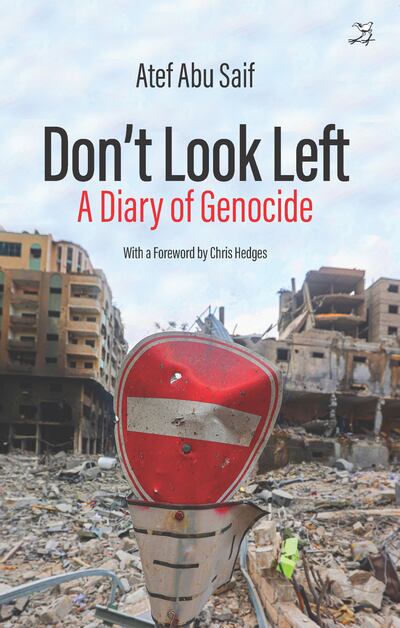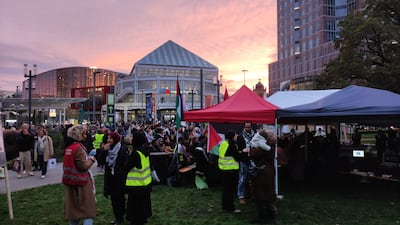Live updates: Follow the latest news on Israel-Gaza
As well as the unconscionable death toll of more than 40,000 people, a grave threat facing Palestinians amid the Israel-Gaza war is the dehumanisation of their experiences, according to author Atef Abu Saif.
Speaking at the Frankfurt International Book Fair on Saturday, Palestine’s former culture minister discussed his war memoir Don’t Look Left: A Diary of Genocide and his homeland's future prospects.
He noted that the killing of Hamas leader Yahya Sinwar by the Israeli military will not necessarily hasten the end of the conflict.
"I believe that it doesn't matter who is controlling Hamas now, whether it was Yahya Sinwar or the one who comes after him. The only way to stop this war is the withdrawal of Israeli troops from Gaza," he said. "Any peace deal should be convincing for the victims; otherwise, they will not accept it in the future. What I am saying is that any immediate deal should be part of a larger plan to regain the peace process."
With The National previously reporting on a new peace plan between Israel and Palestine, formulated by the European Union and Arab states, Abu Saif emphasises that any such initiative will falter unless Palestinians have their own homeland as part of the deal.
“Our history is a series of wars. But at a certain moment, you have to realise you cannot live in peace if you don't believe in it,” he said.
“And I'm telling you, the Palestinians are very willing to have peace, but you can't have peace if you don't give them their rights. It's not your peace; it's not about what makes you happy. Peace is about what makes everyone happy."
It is a prospect that was far from consideration when Abu Saif began writing Don’t Look Left: A Diary of Genocide at the onset of conflict last year.
Published in March, the book is a searing first-hand account of the initial 85 days of the Israeli invasion of Gaza. Through a series of daily entries, the author details the carnage and despair faced by Gaza residents as they struggle to survive relentless military assaults. At the same time, he offers poignant snapshots of life in the refugee camps, where birthdays and weddings are still celebrated amid the chaos. The diary concludes with Abu Saif fleeing Gaza with his 15-year-old son, leaving behind a war that would later claim the lives of his father, niece and best friend.

Abu Saif said he began documenting his experience in real time to cope with the daily trauma.
"I would wake up and ask myself, 'What if I am actually dead and I am somehow here walking around this community of dead people?'" he recalled.
"What is the proof that all those people around me are not dead like me? I will tell you how – whenever I finished writing, I would read it out loud. So when I heard my voice talking about myself, I would think that whoever wrote this must be someone who is indeed alive… I wrote the book as a means of survival.”
That resolve is evident in the memoir’s descriptions of daily social life in the Rafah and Jabaliya refugee camps, both of which sustained relentless Israeli bombardment during the war.
"There is still love in Gaza; people get married and still have these very huge and joyful weddings where we all danced the dabka," he says. "At the Rafah tent, I held a birthday celebration for my son where I made him pasta. We had plenty of pasta from the assistance package we got."

More stories of Palestinian survival and resilience are being told at the Palestinian Liberatory Book Fair, taking place in a park opposite the Frankfurt Trade Fair grounds, where the world's largest trade fair for books is held.
Founded by registered association Palastina Verein (Palestine Association) and ending on Sunday, the event was held in protest of the Frankfurt International Book Fair's controversial decision last year to cancel a planned literary award ceremony for Palestinian author Adania Shibli for her novel A Minor Detail, which is set in Gaza. The move led Arab publishing bodies and organisations, including the Sharjah Book Authority, to withdraw from the festival.
Held in a tent, more than 100 books – ranging from novels and memoirs to history books – about Palestine or by Palestinian authors are on display, in addition to film and documentary screenings featuring works by Palestinian filmmakers.
“We are trying to confront German institutions because we want to break the silence when it comes to cancelling and silencing Palestinian voices or people advocating for Palestine,” co-organiser Khalil Pierre told The National.
"Right now, we have all these books donated by authors personally from their publishing houses, and they are purely for showcasing. Eventually, we want to have a library from where we can lend the books to the community.”

